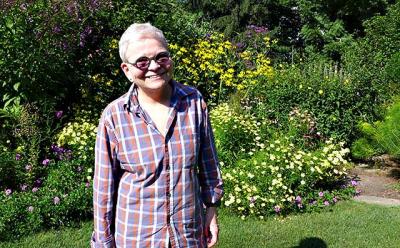Celeste Gainey Follows Her Light

As a child in Santa Barbara, the first thing Celeste Gainey wanted to be when she grew up was a poet. That ambition was fully realized in March with the publication by Red Hen Press of her first book, “The Gaffer,” from which she will read selections at the Hampton Library in Bridgehampton on Tuesday. However, the trip from there to here was a circuitous one, involving two careers on two coasts and almost 40 years during which she wrote “a lot of faxes and contracts, but no poetry and nothing creative.”
While taking college-level classes at the same time as earning her high school degree, she took a course in mass media and became, unexpectedly for someone who had never handled even a Brownie camera, enamored of filmmaking. That led her to the B.F.A. program in film and television at New York University’s Tisch School of the Arts.
“When I entered the school I thought I wanted to be a director — like everybody else there,” she recalled. She gravitated instead toward lighting, and after taking a summer course taught by Ross Lowell, a cinematographer and founder of a theatrical lighting company, the other students asked her to light their films.
In 1974, after earning her degree, she became, not without a struggle, the first female gaffer — the chief electrician in a film or television production unit — to be admitted to the International Alliance of Theatrical and Stage Employees (I.A.T.S.E.). “I think a lot of those guys finally realized, ‘Hey, my daughter could get in,’ and many more women were let in after that.”
While feature film production was on the wane in New York City after she graduated, Ms. Gainey found work first with WNBC News as a vacation relief employee and subsequently on news crews for all three networks. “None of those guys wanted me there. Once I went out with the two supposedly most gentlemanly men at NBC News, and neither of them spoke to me, unless I asked a question.”
She then worked on such documentary programs as “60 Minutes” and “20/20,” as well as on “Dog Day Afternoon,” “Taxi Driver,” and “The Wiz,” among other features, but by the end of the 1970s, “I wasn’t really interested in becoming a cinematographer, and being on a feature was no longer glamorous for me.”
When a friend asked her to light a restaurant he was opening in Manhattan, she jumped at the chance. What followed was a new career in architectural lighting, which she pursued in the 1980s and 1990s, eventually moving to Los Angeles and opening Gotham Light and Power, a boutique lighting design studio. She created lighting for restaurants, offices, schools, and department stores throughout the country.
Ms. Gainey first came to the East End in the early 1980s. Her partner at that time, Amanda Pope, was making a film about Jackson Pollock for “Strokes of Genius,” a mini-series produced by Courtney Sale Ross. Ms. Gainey did the lighting for the film, and the project brought her into contact with Lee Krasner, Conrad Marca-Relli, Mercedes Matter, and Jimmy Ernst, among other luminaries of the art scene here.
She moved back to Los Angeles in 1988, and within a few years, after the relationship with Ms. Pope ended, she met Elise D’Haene, a novelist and screenwriter. The two have been together ever since. They purchased a house in East Hampton in 1997 and moved here full time in 2000. Ms. Gainey opened a lighting fabrication studio with Mark Figueredo here while Ms. D’Haene was writing for television and The Star, where she became arts editor.
Several years into the new millennium, Ms. Gainey “just felt done with lighting. And that’s when I began to write. What I was writing appeared to be poetry, but I didn’t know what the hell I was doing.” In search of a context in which she could learn what she needed to and be held accountable, she entered a low-residency M.F.A. program at Carlow University in Pittsburgh, where Jan Beatty, a poet whose work she admired, became a mentor.
“Poor Jan. I didn’t know anything. I was a complete blank slate as far as poetry was concerned. As with lighting, I attacked it.” After graduating, a chapbook sent to an artisanal press in Pennsylvania brought her to the attention of Eloise Klein Healy, who had an imprint at Red Hen Press.
Ms. Gainey and Ms. D’Haene moved to Pittsburgh in 2012. “Because it was an industrial hub for so long, it has the museums, the culture, and because of Frick and Heinz and Mellon and Carnegie, it has all these amazing public institutions and foundations. I was taken with the people there when I was in school. It had a great writing community, and that’s how we ended up moving.”
“It’s poetry, so it’s not like I’m burning up Twitter,” she said, “but the reception for ‘The Gaffer’ has been great.” She came east from Pittsburgh not just for the reading at the Hampton Library but for several readings in New York City. The book weaves her work in the film industry with her personal life, past and present, in language both direct and evocative. As Aaron Smith, a poet, put it, “ ‘The Gaffer’ is a book about light: how it finds us, changes us, and shapes who we are and how we see.”
Tuesday’s reading and book signing at the Hampton Library will take place at 7 p.m. All proceeds from book sales will support the library.
